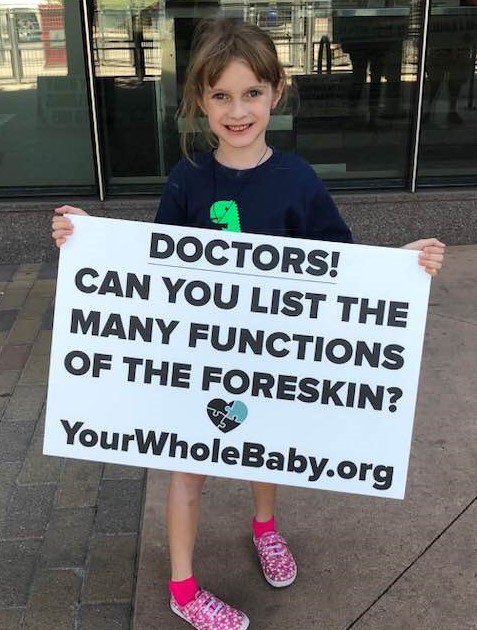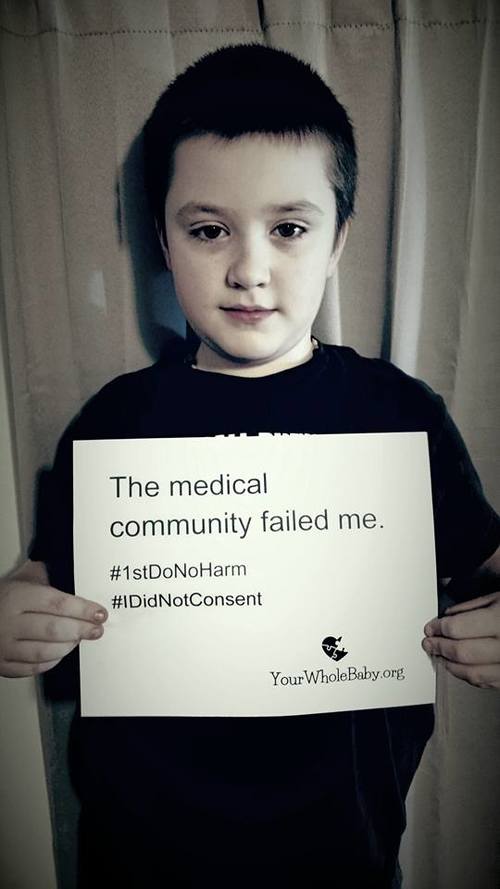Genital Autonomy is a Family Value
Just like the many other values you will instill in your children, genital autonomy is a value that you should feel comfortable and proud discussing with your little ones. For some people, this topic can be more difficult to talk about because it centers around the genitals, but if we want to ensure this and future generations are protected from genital cutting, this topic needs to be discussed early and often.
As the founder of Your Whole Baby, it was not really a question of when or what to say to my daughter about genital autonomy because she was inundated with everything “Your Whole Baby” from the age of three. She is a curious little bee and asks lots of questions and I answer them openly and honestly, while simultaneously doing my best to keep the answers age-appropriate.
My daughter
I believe that as soon as your child is able to understand the most basic concept of “Some doctors tell people they should cut off part of their baby’s penis when the baby is born,” you should start the conversation. Kids get it. My daughter was so relieved to know we would not do that to “our baby brother” and she proudly proclaims to everyone that we have a “baby-saving car.” (Your Whole Baby decal = baby-saving car.)
I just recently started explaining circumcision to my 4-year-old son. I told him that some doctors cut off parts of babies’ penises when they are born. I told him we did not allow the doctor to do that to him. He was truly perplexed and the first thing he wanted to know was if I chased the doctor down and put them in jail. Children understand.
Regardless of the sex of your child, talk to them about genital autonomy regularly. Make it as much a part of your family’s value system as recycling is, or going to church every Sunday, or whatever values you hold dear. The more your children grow up hearing and understanding that there is nothing wrong with the whole, normal human body, the easier it will be for them to see through the bogus information our society tries to tout as fact.
Pride for Their Whole Bodies
If your child’s penis is intact, you need to teach him why he remains intact and why he should value his whole body. There is currently a small minority of adults in U.S. society who, while fortunate enough to have escaped having their penises cut at birth, still wish they had been circumcised, based on a misinformed perspective on foreskin. It is easy to imagine that these men/adults were made to feel bad about their bodies when they were younger — when circumcision rates were higher and intact bodies were not as common in our culture.
my son
It’s also easy to imagine that their parents did not discuss why they didn’t circumcise, did not discuss the many benefits of the foreskin, and did not tell their children how fortunate they are to have had their bodily autonomy respected. These men may not realize the pleasure they experience during sexual activity would be altered if they were circumcised. They may not know the pain and complications many circumcised adults experience.
As the rate of circumcision declines, society will increasingly recognize and embrace that foreskin is the norm. It is still important in these changing times for parents to instill in all their children a sense of bodily confidence and pride. Regardless of your child’s sex or gender, make genital autonomy such a normal part of your family’s value system that your children will grow up knowing that cutting off the healthy body parts of newborns is as ludicrous as it sounds.
Talking to Your Circumcised Child
If you are a parent with a circumcised child, talk openly and honestly with him, early in his life, about what happened to him. If you bury your regret, your child may very likely become a parent who wants to have his own son cut. Your honesty and frankness will lay the foundation for the future generations of your family. At a young age, keep it simple and matter-of-fact. Doctors make mistakes. Parents make mistakes. I thought I was doing what was best for you. I learned too late that the information I had was wrong.
But here’s the catch: You need to be in a healthy mental state yourself before you can start discussing this with your child. The more healing you have found, the more likely he will also be able to find healing. You do not want to project your pain and regret onto your child, so you must first find a way to accept that you did the best you knew how at that given time.
Your son may or may not have complications beyond those that are inevitable when the foreskin is removed; he may or may not have anger or resentment about what was done to him; he may or may not want to discuss this topic with you. But a parent who is honest, a parent who takes responsibility, a parent who apologizes, is a parent whom a child will want to forgive. Talking about this with your son can be extremely difficult, but it can also lead to healing for everyone involved. Trust your child's ability to be resilient and trust that he will be able to forgive you.
Remember that many complications of circumcision do not appear until puberty. As uncomfortable as it can be, make sure to discuss this with your child to make sure he isn’t experiencing additional unnecessary pain caused by circumcision. Let your son know that this topic is not taboo to discuss, and you are always there to listen, answer questions, and help. Don’t wait for your son to approach you. The conversation should start with you. It should start when your son is young and should continue through adolescence.
Read stories from circumcised adults who speak out…
Regret Parents Share
We asked regret parents how they discussed circumcision with their circumcised children. This is what they had to say:
“I explained that people think it's beneficial to cut part of the skin off of a penis. I said that research has been done to prove it isn't beneficial and that some people still do circumcise. I told him I didn't know any better and that my husband is circumcised and every boy in our family is.”
“One thing I have told my older son, now 13, who IS cut is that he certainly is not a freak or a weirdo . . . that unfortunately a LOT of kids his age are cut the same way . . . because a LOT of moms and dads did not know better years ago, that doctors lied to us, and we trusted the doctors . . . but then we learned MORE.”
“He asked a few questions like why they think it is better. I explained people thought that cutting the skin off made it easier to clean/more hygienic. I asked if he had any other questions and he said no. Then after a shower he said, ‘I don't know why they thought it would be cleaner. My penis gets dirty.’ I said all penises can get dirty if they aren't cleaned and just reminded him to make sure his is clean every time he showers.”
“I just don't want him to feel like I love our baby more. He did ask why I didn't do research with him — like I didn't care as much about him. I told him I was young and I didn't know any better. Parents are always learning, just like their kids. I said to him, I loved you SO SO much I felt I HAD to do the best for you and the doctor said this was best! I believed the doctor when I shouldn't have.”
“It's not only okay, it's *important* for our kids to know that we are people too and we make mistakes and mess up, even as parents. It helps them learn empathy and compassion and forgiveness and self-forgiveness.”
“Don’t wait for them to ask. Start the conversation on your own accord so they know they can talk to you about it. And keep the dialogue open, bring it up every so often. Maybe once a year.”
“As your son gets older, continue the conversation. It will also hopefully give you some peace in knowing that your son forgives you and loves you.”
When the Pain is Too Much
We have heard from many regret parents who have gone through extreme times of depression when they learned the truth about circumcision. Some of them shared that they contemplated suicide. Some of them were not sure they could forgive their partners who had pressured them to go through with it. Some of them found it difficult to enjoy time with their child because their guilt was overpowering their joy.
If you are experiencing this level of pain, it is crucial that you get the help you need to begin to heal. Humans are imperfect beings and can make grand mistakes. A parent can make a mistake that hurts their child — the person they love most in the world, the person they would give their life for.
Allowing circumcision to destroy your relationship with your child won’t change the past, but it will impair you and your child’s future. Your Whole Baby has a list of mental healthcare providers who may be able to help. We also have a peer support group that may be of assistance. Whatever you need to do to forgive yourself so that you and your child can live a healthy, happy life, you need to do. Your mistake may be irreversible, but it is still that, a mistake. One that you deserve to forgive yourself for and one that does not have to dictate the rest of your life.
Start the Conversation
The time to talk to your children about genital autonomy is now. They will be the change-makers of tomorrow and with your guidance, they will know the value of respecting all people’s genital autonomy.
Jen Williams is the founder of Your Whole Baby. She is passionate about many causes including the human rights violation of genital cutting happening to children around the world. Jen lives with her two happily intact children.







